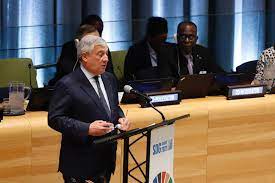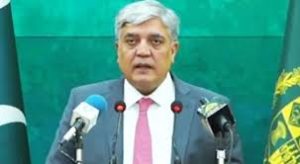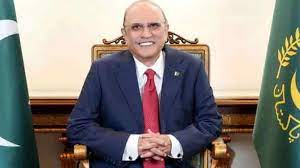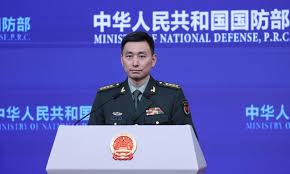Italy: Global path for sustainable development. FM Tajani at UNGA

Rome: The Italian Foreign Minister spoke at the United Nations General Assembly in New York, outlining Rome’s outlook on how to engage with Africa – including through the G-7 and starting with aiding Tunisia.
The Italian Foreign Minister took part in the Sustainable Development Goals Summit right ahead of the United Nations General Assembly. He used his speech to outline Rome’s concerns and priorities, highlighting the attention placed on the African continent – the centrepiece of Italy’s Global South approach.
The Italian-led G-7 in 2024 will prioritise this, he assured in closing, noting it will be “inclusive” and focusing on “creating the conditions for greater collaboration with all our global partners.”
In a nutshell. “Political and economic instability, climate change, food insecurity, health crises. These factors of crisis, together, have set in motion an arc of instability that goes from the Gulf of Guinea to the Gulf of Aden,” remarked the Italian FM. “Our challenge is enormous. The situation is not about to explode; it has already exploded.”
First, he said, the migration issue is “beyond control. The consequences of instability in so many countries are creating a flood of migrants from the Sahel region, West Africa and East Africa. Individual States or regions cannot address these challenges alone.”
The solution entails addressing the root causes of migration, he explained, including through collaboration on issues like food security and “global and strategic solutions” to address them.
“One thing is clear: we must listen to Africa. We must look at Africa through African glasses, not European glasses, not Italian glasses. In July, Italy hosted the International Conference on Development and Migration in Rome. We launched the Rome Process with the aim of tackling the root causes of migration, which are closely linked to the global challenges we are discussing today.”
“Our commitment to the sustainable development goals cannot succeed if we do not seriously combat the human traffickers who steal the future of tens of thousands of young Africans every day – merchants of death who have turned the Mediterranean into a graveyard where Africa’s future is dying.”
Mind Tunisia. The EU’s High Representative for Foreign Affairs, Josep Borrell, recently aired the “incomprehension” member States expressed regarding the EU’s pact with Tunisia, spearheaded by Italian Prime Minister Giorgia Meloni and supported by EU Commission President Ursula von der Leyen. European capitals and the Parliament are yet to unlock €100 million in emergency funding to help alleviate Tunis’ crippling economic crisis.
“When the European Commission signs an agreement, that agreement must be respected,” retorted FM Tajani. Given that the memorandum was signed by the European Commission and the European Council was informed, any action on behalf of Mr Borrell geared at not sharing the EU’s executive choices would be improper.
And don’t forget the Balkans. Aside from being the second major migration path into Europe, the area is still dealing with instability and waiting for the EU to take the integration process seriously. FM Tajani, who had chaired a ministerial meeting with his Balcanic colleagues in April, met them again on Monday, reiterating the importance of stability and the need to promote joint action to tackle irregular migration.
He also emphasised the coming opportunities for discussion (such as the EU-Western Balkans Summit to be held in Brussels in December) as the ideal arenas to give new impetus to the European enlargement process within a certain time horizon.
Rome attaches great importance to the European integration of the Western Balkans, remarked FM Tajani. “We are committed to accelerating this process also through gradual integration measures.”





